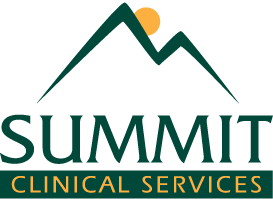FAQ
Here are our most common Frequently Asked Questions (FAQ.)

How Long Does Therapy Take?
The length of therapy and frequency of sessions is decided by you and your provider. Together, you will consider your treatment goals, the most effective way to reach them, and the frequency of sessions that will work the best for you. Some people desire to have weekly sessions, while others may come to sessions less often, such as every other week. As you, your children, or your family begin to reach your goals for therapy, it is not uncommon to gradually spread sessions out. Whatever your decision, this is an issue that you and your provider can revisit anytime to make sure that your experience at Summit is comfortable for you and effective in helping you reach your treatment goals.
How do you do therapy with children & teens?
Therapy with children and teens usually begins by first meeting with the parents and discussing their concerns and treatment goals. You and your therapist will then lay out a strategy for how to most effectively reach those treatment goals with your child. This can include individual therapy with the child/teen, parenting guidance, and/or family therapy. Other recommendations can also be made by your therapist, such as additional testing, individual adult or couples therapy, or a consultation for medication.
Therapy with children and teens involves establishing a positive rapport with the child/teen and then engaging him or her in working toward a positive treatment goal. This can involve talking, playing games, learning important skills (such as anger management skills, cognitive flexibility, sibling skills, social skills, coping skills, communication skills), exploring the child/teen decision-making process, examining family patterns/dynamics, and so on. While respecting your child’s privacy, it is important for the therapist and parent to maintain close communication so that progress can be monitored and the treatment focus can be adjusted as needed.
Will I need to take medication?
Many people overcome challenges such as depression, anger control, and anxiety without the use of medication. For some, however, medication can play an extremely important role in attaining their treatment goals. Thoughtful use of medication can not only bring relief from suffering, but can also enhance your work with your therapist. If you request a psychiatric consultation, our psychiatrists or psychiatric nurse practitioners will thoroughly evaluate you or your child/teen and carefully discuss which medications may be helpful for your situation. If you choose to begin a trial of medication, your prescriber will work with you to carefully monitor your response to the medication and decide the best course for adjusting your medication dosage.
How much will therapy cost?
At Summit, we strive to provide the very best in mental health services at a cost that is commensurate with community standards. The fee for a psychiatric evaluation varies, depending on how many sessions are needed to complete the evaluation (e.g., typically one session for adults, two for children and adolescents). Please check with our office staff for the fees charged by your therapist or psychiatrist.
What insurance do you take?
At this time, all Summit clinicians are members of the Blue Cross/Blue Shield PPO and Blue Cross Choice. Some clinicians also accept standard Medicare, Blue Cross/Blue Shield HMO through Northwestern Medicine, and Aetna. Summit clinicians are also able to see patients for self pay.
Patients are responsible for co-payments, deductibles and any amount not covered by their insurance. Policy benefits vary greatly within all insurance networks, and patients are responsible for knowing their specific insurance plan and parameters of their plan. If a service is not covered by their insurance plan, the fee for services may be required from the patient. Patients are responsible for providing Summit Clinical Services with their full and correct insurance information, and communicating to Summit Clinical Services any change in insurance immediately.
What should I bring to my first session?
Please bring your insurance card, driver’s license or photo ID, and credit card that you would like to place on file with the office. For medication appointments, we recommend bringing a list of current medications, allergies and medical problems as well as any past psychiatric medications that you might have tried. Please feel free to bring any other materials that you think will help your provider learn more about you (or your child) and the goals you want to accomplish in therapy.
Please arrive thirty minutes prior to your first session to complete all paperwork. Check in at the reception window and let the receptionist know that you have arrived for your first appointment. The receptionist will give you some initial paperwork to complete, which includes a description of our privacy policy and other important office policies that you will want to be aware of. (You may wish to print and complete the initial paperwork from our website prior to your first session. If all initial paperwork is printed and completed in advance, please arrive ten minutes before your appointment time to complete the check in process with the receptionist.)
Get In Touch
If this is an Emergency please call 911 immediately.
Call
(630) 260-0606
Phone Tree Prompt Options
- Press 1: if you are new to our office.
- Press 2: to schedule an appointment or to leave a message for your provider.
- Press 3: for prescriptions and medications.
- Press 4: for the Business Office or additional information:
- Press 1: for business office hours, location, and fax number.
- Press 2: for billing, medical insurance, claims, or payments.
- Press 3: for medical records.
- Press 4: to reach the Office Manager.
Fax
(630) 260-1049
Business Office Hours
(M – F) 8:00 am – 4:30 pm
Clinician Hours
(M – F) day and evening availability
